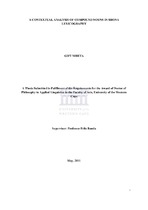A contextual analysis of compound nouns in Shona lexicography
Abstract
This research is in the area of lexicography and investigates the relationship between Shona terminology development and the culture of the language community for which the terminology is intended. It is a contextual analysis of compound nouns found in Shona terminological dictionaries. The study specifically explores how lexicographers together with health, music, language and literature specialists make use of their knowledge about Shona cultural contexts in the creation of compound nouns. Thus, this research foregrounds Shona socio-cultural contexts and meaning generation in terminology development. This study employs a quadruple conceptual framework. The four components of the framework that are utilised are the Traditional Descriptive Approach (TDA), Cognitive Approach (CG), Systemic Functional Approach (SFL), and Semiotic Remediation (SRM). TDA is used in the linguistic categorisation of Shona compound nouns. In addition, it provides the metalanguage with which to describe the constituent parts of Shona compound nouns. As TDA is mainly confined to the linguistic dimension, this research employs CG, SFL, and SRM to explore the cultural and socio-cognitive dimensions of terminology development.

